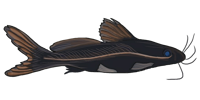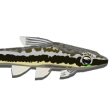L128, Deworming/Conditioning/Breeding.
-
puertoayacucho
- Posts: 28
- Joined: 03 Oct 2005, 01:42
- My cats species list: 1 (i:0, k:0)
- Spotted: 2
- Location 1: SLC, Utah
- Location 2: USA
L128, Deworming/Conditioning/Breeding.
Hi fellas, my name is Ed and I've been a member here for some years, as well as in Plecofanatics and Scot Cat, all wonderful places to learn pleco. I hardly have time to post anything interesting (or anything at all for the fact) since I am pretty busy administrating Finarama.com, a website dedicated mainly to wild Pterophyllum. I'm an Aquatic Biologist (from Venezuela) and collected a lot of fish throughout a good part of Venezuelan geography, including a number of loricarids and other catfish. I make a living as a translator here in SLC, Utah. Never worked much professionally (pocketwise) as a Biologist.
I just acquired a nice pair of L-128 (I love them. Most of you that like the species may know they are from Puerto Ayacucho, Amazonas state in Venezuela, from the Ature Rapids, just off, the banks of the Orinoco and surrounding tributaries..my son was born in Pt. Ayacucho, hence my user's name). The pair in about 6 inches long, clearly sexable, but were kept in conditions out of their natural parameters (African Cichlid habitat parameters). I have just finished bringing them down to Orinoco conditions, similar to those the species is found in throughout the Atures Rapids, that is, low 6's, soft water, around 100ppm (using +/- 70/75% R/O to 30/35% Tap and Kent blackwater and Catappa leaf). Excellent circulation and aereation, cycled sponge filtration, adequate stonework and appropriate quality sand bottom. Temp is at around 80-82F for the moment so as to stimulate their metabolism and appetite. Will cool down to about 78F after they are eating properly and I get them pooing right. If I am missing any helpful info or details, please let me know.
What worried me is there feces, white and stringy, GI parasites no doubt. I have restrained food for some 48 hrs in the hope of getting them to take the medicated feed I prepared using metro, prazi, garlic oil and a binder on high proteina spirulina wafers and frozen bloodworm. Basically I mix API General Cure with Seachem Focus and add some Garlic Guard and add all this over the thawing bloodworm and soak some algae wafers in the mix, then refreeze to later serve. I think they are not liking it, maybe I mixed in the meds too strong.
Hope I can get some insight from you guys that have been passionate for these species a lot longer than I have.
The goal is to deworn them, get them eating well and ready for breeding and of course, breed them!
Regards
Ed
__________________
Edgar R. Ruiz - Some Orinoco Fish.
I just acquired a nice pair of L-128 (I love them. Most of you that like the species may know they are from Puerto Ayacucho, Amazonas state in Venezuela, from the Ature Rapids, just off, the banks of the Orinoco and surrounding tributaries..my son was born in Pt. Ayacucho, hence my user's name). The pair in about 6 inches long, clearly sexable, but were kept in conditions out of their natural parameters (African Cichlid habitat parameters). I have just finished bringing them down to Orinoco conditions, similar to those the species is found in throughout the Atures Rapids, that is, low 6's, soft water, around 100ppm (using +/- 70/75% R/O to 30/35% Tap and Kent blackwater and Catappa leaf). Excellent circulation and aereation, cycled sponge filtration, adequate stonework and appropriate quality sand bottom. Temp is at around 80-82F for the moment so as to stimulate their metabolism and appetite. Will cool down to about 78F after they are eating properly and I get them pooing right. If I am missing any helpful info or details, please let me know.
What worried me is there feces, white and stringy, GI parasites no doubt. I have restrained food for some 48 hrs in the hope of getting them to take the medicated feed I prepared using metro, prazi, garlic oil and a binder on high proteina spirulina wafers and frozen bloodworm. Basically I mix API General Cure with Seachem Focus and add some Garlic Guard and add all this over the thawing bloodworm and soak some algae wafers in the mix, then refreeze to later serve. I think they are not liking it, maybe I mixed in the meds too strong.
Hope I can get some insight from you guys that have been passionate for these species a lot longer than I have.
The goal is to deworn them, get them eating well and ready for breeding and of course, breed them!
Regards
Ed
__________________
Edgar R. Ruiz - Some Orinoco Fish.
- Shane
- Expert
- Posts: 4625
- Joined: 30 Dec 2002, 22:12
- My articles: 69
- My images: 162
- My catfish: 75
- My cats species list: 4 (i:75, k:0)
- My aquaria list: 4 (i:4)
- Spotted: 99
- Location 1: Tysons
- Location 2: Virginia
- Contact:
Re: L128, Deworming/Conditioning/Breeding.
Conchele pana! Donde estaba escondido?
With regard to the internal parasites, few loricariids will take medicated commercial foods.
The best medications use praziquantel (which is what I actually treat myself with for bilharzia). I would recommend something like this
http://www.fosterandsmithaquatics.com/p ... catid=4756
The drug is easy on the system (I speak from experience) and should cause little to no stress on the fishes.
Be sure to actually clear out the main tank of all fishes and treat in a separate quarantine-type tank. Do not move the animals back to the main tank for at least two weeks. The will assure that any remaining parasites in the main tank die off since there will be no hosts available. Many will die with in hours without a host, but I would give it a full two weeks just to be safe.
-Shane
With regard to the internal parasites, few loricariids will take medicated commercial foods.
The best medications use praziquantel (which is what I actually treat myself with for bilharzia). I would recommend something like this
http://www.fosterandsmithaquatics.com/p ... catid=4756
The drug is easy on the system (I speak from experience) and should cause little to no stress on the fishes.
Be sure to actually clear out the main tank of all fishes and treat in a separate quarantine-type tank. Do not move the animals back to the main tank for at least two weeks. The will assure that any remaining parasites in the main tank die off since there will be no hosts available. Many will die with in hours without a host, but I would give it a full two weeks just to be safe.
-Shane
"My journey is at an end and the tale is told. The reader who has followed so faithfully and so far, they have the right to ask, what do I bring back? It can be summed up in three words. Concentrate upon Uganda."
Winston Churchill, My African Journey
Winston Churchill, My African Journey
- MatsP
- Posts: 21038
- Joined: 06 Oct 2004, 13:58
- My articles: 4
- My images: 28
- My cats species list: 117 (i:33, k:0)
- My aquaria list: 10 (i:8)
- My BLogs: 4 (i:0, p:97)
- Spotted: 187
- Location 1: North of Cambridge
- Location 2: England.
Re: L128, Deworming/Conditioning/Breeding.
I have used medication based on Flubendazole with good success - I haven't tried it on myself, but from giving it to the fishes, I'd say it's "easy" on them as well. Unfortunately, it seems Flubendazole based products are hard to get in the US.
Larry (Apistomaster) treats any wild-caught fish with a mix of Flubendazole, Praziquantel and Metronidiazole (sp?). All treat slightly different types of internal parasites - most parasites are killed by all of them, but some are only sensitive to one of the above.
--
Mats
Larry (Apistomaster) treats any wild-caught fish with a mix of Flubendazole, Praziquantel and Metronidiazole (sp?). All treat slightly different types of internal parasites - most parasites are killed by all of them, but some are only sensitive to one of the above.
--
Mats
-
puertoayacucho
- Posts: 28
- Joined: 03 Oct 2005, 01:42
- My cats species list: 1 (i:0, k:0)
- Spotted: 2
- Location 1: SLC, Utah
- Location 2: USA
Re: L128, Deworming/Conditioning/Breeding.
Hi Mats, yes, I am aware of Larry's way of doing it (a very good friend of mine BTW and the first person I contacted with my concern), but I usually medicate in feed and not in the water column. I think I over did the concentration and bittered things up too much.
The way I think I will go is to offer live blackworms and after I see them back on track, I will introduce the medicated feed (a new batch). I haven't checked them this morning.
I am also thinking of adding prazipro today...half dose, as the water is pretty soft.
Any other suggestions welcome, and thanks a mil
Ed
The way I think I will go is to offer live blackworms and after I see them back on track, I will introduce the medicated feed (a new batch). I haven't checked them this morning.
I am also thinking of adding prazipro today...half dose, as the water is pretty soft.
Any other suggestions welcome, and thanks a mil
Ed




